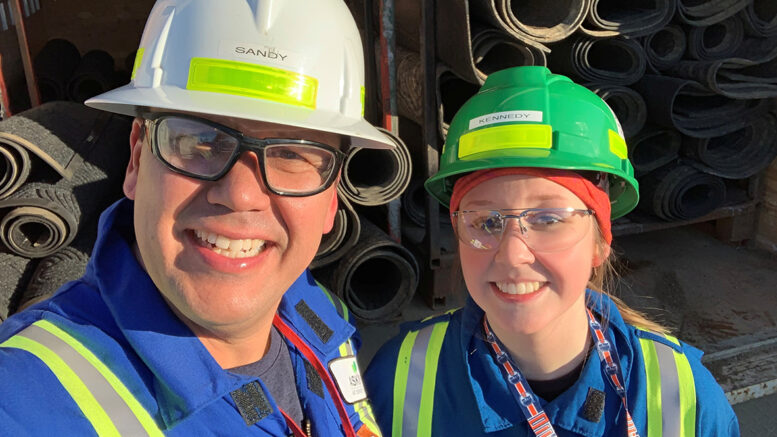By Laura Mushumanski, Local Journalism Initiative Reporter
(ANNews) – “Our business is about purpose,” shared Sandy Sanderson, a member of Mikisew Cree First Nation and founder of Askiy Mat Service Inc. who is committed to purpose and meaning in everything that he does. “I am not an entrepreneur; I am more of an eco-preneur. I am not about making money or about being rich. Where I am from [Fort Smith, NT], there have been a lot of environmental impacts in the region for years and misunderstandings of treaty rights.”
In the last 10 years, the United Nations Declaration on the Rights of Indigenous Peoples (UNDRIP) has stepped in to acknowledge and support Treaty Rights and Responsibilities that directly impact the natural environment. “It is a shared land; our people have been here for thousands of years,” said Sanderson. “Reconciliation exists in terms of reciprocity” and collectively everyone can work together to uphold Treaty Rights and responsibilities, which include being responsible for taking care of Mother Earth, he added.
“Indigenous people have been put in a position and identified as not being valid keepers of the land,” said Sanderson. The history of Canada has misled and shielded Canadians when it comes to the true history of Canada. “Here we are talking [in] English, and English has only been spoken here for a few hundred years. Whereas Cree has been spoken for thousands of years. Yet when we went through school, they said English and French were the languages to learn. At what cost [has that been] to our culture?”
Rooted deeply in nehiyawewin culture, Cree people have an innate responsibility and understanding that the land does not belong to us, instead we belong to the land and are inherent keepers and stewards of the land. Treaty Rights and Responsibilities are relational because natural laws are tied to the understanding of being a good relative and taking care of everyone and everything that resides on Mother Earth as a sustainable way of life. Sustainable practices within the environment branches out into respecting the ways of knowing tied to the ‘Seven Generations’ and continuation of life.
“I was looking for an opportunity, and for a type of company that would do something to help the environment. And as much as there are impacts on the environmental side, there are also benefits on the economic side” when it comes to creating opportunities within Indigenous communities to develop and build capacity.
Sanderson began to interview people who worked in the oil sands. This is when he came across the idea of entrance mats. “The manager at Suncor shared that there were people tripping over entrance mats because they are washed in open pocket washers, resulting in them looking like a piece of bacon. People trip on them, then they get thrown out because they are not safe and that impacts the environment,” Sanderson said. So, he began to research about how the entrance mats were being cared for.
“I came across the guy who invented an eco-friendly machine that washes mats. The most intriguing part was the environmental offset that it brought. The machine washed, dried and rolled up the mat in 90-seconds, instead of putting it in a washer that spins and stretches the mat for 40-minutes before putting it in the dryer. It turned out that the machine we use uses 96% less water than our competitors while offsetting carbon emissions.”
Currently, Askiy Mat provides service to hundreds of mats at the Suncor and Syncrude oil sands sites, offsetting carbon emissions equivalent to approximately 200 homes annually just by entrance mats alone. And with the Bill C-39 Green Washing Bill, Askiy Mat has been third party verified ensuring their customers can substantiate the scope 3 reporting without being fined millions of dollars.
“The reality is that there are share holders investing into these corporations based on the reports that they are doing environmentally, but not all of them are justifiable. For me that was important because of how this can offset carbon emissions, and where we are more of an environmental company first, then an entrance mat company.”
Seven months before the pandemic, Sanderson started Askiy Mats. (Askiy means ‘Earth’ in Cree).
“After someone wiped out on an entrance mat at one of the oil sand companies, I got an email asking how soon I can start my company. Since then both Suncor and Syncrude went from having regular incidents caused by entrance mats to zero within the past 6 years since we have taken over.”
Askiy mats are made from recycled water bottles and have identification tags on them that allows them to be tracked. In addition to being an environmental company, Askiy Mat is also 100% Indigenous owned, bringing awareness to the importance of Indigenous businesses being independent of dependency issues that perpetuate into the social determinants of health, by building and developing economic and sustainable capacities within their own communities.
For Sanderson, another emission impact that Askiy Mat has been able to offset is from supply chains, with supply chains being the leading factor and problem of carbon emissions by creating 124 million metric tonnes per year. The scope 3 supply chain emissions being created are 10-12 times more per year in causing environmental emissions than from both the offset of scope 1, what is being created on site and scope 2, utilities being used. And because Askiy Mat is located close to oil sand companies, the supply chain emissions are reduced quantifiably while Sanderson continues to honour Treaty Rights and Responsibilities for future generations to thrive in abundance, including Mother Earth.
Sandy Sanderson and Askiy Mat were selected as a finalist for this year’s Emerald Awards that recognize organizations for their environmental excellence.



Be the first to comment on "Sandy Sanderson’s understanding of being an ‘Eco-Preneur’"